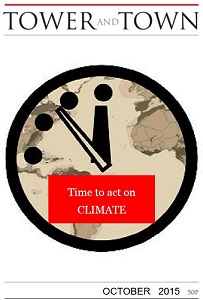

Tower and Town, October 2015 (view the full edition) (view the full edition)A Bright, Fair, Post-Carbon World?We could be so close. Some years ago, a German firm, Desertec, developed a technology, Concentrating Solar Power, (CSP) that could potentially power the entire world from a small percentage of the world's deserts. It's used in the US and Spain and, with high voltage direct cables, could power population centres thousands of miles away. But it's not just solar panels and wind turbines. Energy is being developed from biochar and algae, tidal and wave power. Researchers have created a fully transparent solar concentrator, which could turn any window or sheet of glass - like your smartphone screen - into a pholtovoltaic cell. Smart grids have been developed to move the energy where it's needed, smart thermostats make homes more efficient and smart meters can moderate demand in response to fluctuations in wind and sun. Importantly for a world of growing inequalities, a green economy grows jobs. The world could be running on renewables. Why isn't it? Because the price on the tag for fossil fuels is cheaper. The whole community pays the real cost. The International Monetary Fund reports that the costs paid by communities to deal with the pollution, damage to health, and increasing devastation of climate change amounts to $5 trillion a year - £1,000 per annum for every citizen. The true cost of burning fossil fuels needs to show up in their price. The call for carbon pricing is beginning to come from all sides, from the President of the World Bank to the Pope - even from energy companies themselves. Since our entire economy is based on fossil fuels, a significant price on coal, oil and gas will raise the price of everything. On its own, this price rise would create economic chaos. And it would be particularly hard on those with low incomes. Carbon Fee and Dividend, a policy rapidly gaining credence and popularity in the US, calls for the entire sum gathered from a rising price on carbon to be divided up and returned in equal amounts to individuals - shielding the poor, keeping the economy vibrant, and incentivizing all kinds of green investment. Is this a possibility for us? Judy Hindley |